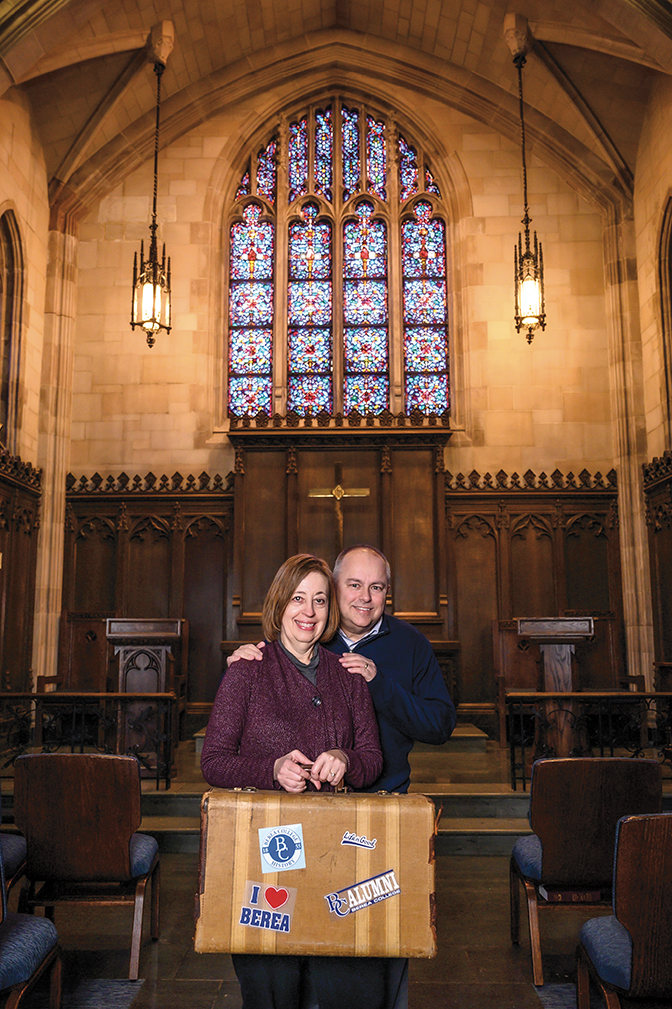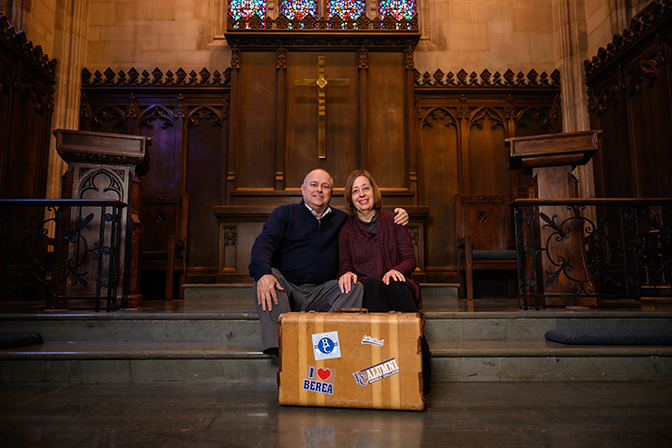One day, in 1983, a guidance counselor in southwest Virginia dusted off an old Berea College catalog from the 1970s and handed it to one of the school’s seniors, who wanted to go to college but had no way to pay for it. The counselor told the young man Berea didn’t charge tuition, and, right away, that senior knew Berea was the place for him.
“Berea was my only option,” Charles Jackson ’87 said, noting that his father, a coal miner, was disabled. “We didn’t have any extra money. I wanted to go to college, but I thought it was out of the realm of possibility for me. We lived on very little.”
Charles cut grass all summer to save money for his transition to college life, and he managed to amass $175, which he carried with him to Berea. After his parents dropped him off, he explored campus, the Quad, and marveled at the architecture. The environment, he said, made him want to learn.
“I thought to myself, you know, this is what college looks like in the movies.”
Charles was assigned to janitorial duties in Lincoln Hall, a job that would help cover what his summer savings did not, and he declared a major in history while entertaining thoughts of law school in the future. But, sometime later, there was a little bit of a snag. The teaching assistant (TA) in his history class seemed to have an affinity for the letter C.

Regina Abrams ’85 was a tough grader. She was a local, and she was a bit of a prodigy, having graduated from high school at just 16. That put her two years ahead of Charles, though they were roughly the same age. The pair had a lot in common, both having spent the first halves of their childhood without indoor plumbing, both with parents who hadn’t gone very far in school.
Regina, too, had admired campus architecture from the distance of Chestnut Street, the main drag through town that her family drove daily. But she had never actually stepped foot onto campus until her high school English and Latin teacher took her to a play at Ross A. Jelkyl Drama Center, which happened to be entirely in Latin. It was just understood in Regina’s family that this was where she was headed next.
“My mother knew the value of education,” Regina said, “and she wanted more for me than she had for herself.”
Her future seemed wide open. Regina loved English and civics, but after taking a history class in college, the subject “spoke to her heart,” and that became her major. Choosing her as a TA, her history professor encouraged her to continue studying history in graduate school, but Regina had other plans. She wanted to be a lawyer.
Charles was forgiving of his difficult TA, and the two became good friends through their shared love of history. They played tennis together, and Charles would frequent Regina’s mother’s house nearby for visits. Regina studied abroad in Greece, graduated and went on to law school. Charles left his janitorial duties behind and landed a job with The Pinnacle, Berea’s student newspaper, eventually working his way up to editor.
“I came with $175, but I left a whole lot richer,” he noted, meaning he was now rich in knowledge and experience. He had taken out a few small loans over the years to cover things like eyeglasses and a suit for his internship with Congressman Larry Hopkins in Lexington, and left school owing about $2,000.
He moved back to Virginia, where his experience with the student newspaper and political internship helped him get a job as campaign manager for a local attorney who was running for Virginia’s House of Delegates. They lost, but thanks to that lawyer’s advice, Charles took a job with State Farm in 1988, and he has worked there ever since.
One Thursday night in the 1990s his phone rang. Charles remembers because “Friends” was on television, and he wondered who in the world wasn’t watching it also.
Berea completely changed my trajectory. It’s hard to even quantify what that experience at Berea did for me. It opened opportunities, gave me a chance to explore the world. Berea allowed me to reach my potential.
Regina Jackson ’85
“Is this the Charles Jackson who went to Berea?” the voice on the other end asked, and he confirmed that he was. The voice belonged to Regina, who was reaching out to a long-lost college friend. She was in Bowling Green, working as a lawyer; he was in Louisville. Regina was returning his call, a call he had actually made months prior to her mother’s house in Berea. Sometime around Thanksgiving, Regina’s mother remembered to mention it.
They’ve been married now for 25 years. Charles is a business analyst at State Farm, and Regina is a partner with the law firm English, Lucas, Priest and Owsley. She represents school districts in central Kentucky. Looking back, the couple agrees their alma mater unlocked more than their love for one another.
“Berea completely changed my trajectory,” Regina said. “It’s hard to even quantify what that experience at Berea did for me. It opened opportunities, gave me a chance to explore the world. Berea allowed me to reach my potential.”
“Because of Berea,” Charles added, “the son of an illiterate, disabled coal miner was able to move beyond factors that would typically hold someone back. It’s hard to express what a change-maker Berea was. I’m not sure where I would
be today had I not been blessed with
the Berea College experience. Berea provided the skills I needed to escape generational poverty while respecting those who came before me. I will never be able to say, ‘thank you’ to Berea adequately enough!”


